Non-compete agreements are becoming increasingly common in today’s business world as a way to protect a company’s confidential information and trade secrets. These agreements are often used for employees in key positions who have access to sensitive information that, if disclosed to competitors, could harm the company’s business.
When an employee with this type of knowledge leaves the company, they may pose a significant threat to the company’s future success. With a non-compete agreement in place, a company can safeguard against the potential loss of sensitive information and prevent former employees from working for competitors or starting their own competing business.
Table of Contents
Non-Compete Agreement Templates
Protect your business interests and confidential information with our comprehensive Non-Compete Agreement Templates. These printable templates provide a legally binding agreement between employers and employees or contractors, preventing them from engaging in competitive activities or working for competitors during or after their employment or contract term.
Customize the templates to include specific terms and restrictions, such as non-disclosure of trade secrets, non-solicitation of clients, and non-compete within a defined geographic area and time period. Ensure the security and exclusivity of your business by downloading our free, printable Non-Compete Agreement Templates and safeguarding your valuable assets.
What Is A Non-Compete Agreement?

A non-compete agreement, also known as a restrictive covenant, is a legal contract between an employer and an employee that prohibits the employee from working for a competitor or starting their own competing business for a certain period of time after leaving their current employer. This type of agreement is designed to protect the employer’s confidential information, trade secrets, and customer relationships from being disclosed or used by a former employee.
Non-compete agreements are typically used for employees in key positions who have access to sensitive information that could be detrimental to the company if it were to be shared with competitors. Non-compete agreements are generally enforceable by the courts, but it should be noted that the enforceability of these agreements varies depending on the jurisdiction and the specific terms of the agreement.
Protect Your Business with a Non-compete Clause
Non-compete agreements can be an effective tool for protecting a business’s confidential information, trade secrets, and customer relationships. When an employee with access to this sensitive information leaves the company, they may pose a significant threat to the company’s future success. A non-compete agreement can help prevent this by prohibiting the employee from working for a competitor or starting their own competing business for a certain period of time after leaving their current employer.
To be effective, a non-compete agreement must be reasonable in terms of its duration, scope, and geographical limitations. For example, a non-compete agreement that prohibits an employee from working in their field for an excessive period of time or over a wide geographical area will likely be deemed unenforceable by the courts.
Additionally, non-compete agreements should be carefully drafted to ensure they are legally compliant and specific to the employee’s role and the nature of the confidential information they have access to. It’s also important to consider the jurisdiction where the agreement is going to be enforced.
In conclusion, non-compete agreements can be an important tool for protecting a business’s confidential information, trade secrets, and customer relationships, but they must be reasonable, specific, and legally compliant. Businesses should seek legal advice when drafting and implementing non-compete agreements to ensure they are enforceable and effective in protecting their interests.
How To Create A Non-Compete Agreement
Creating a non-compete agreement can be a complex process that requires careful consideration of a number of legal and practical issues. Here are some steps to follow when creating a non-compete agreement:
Determine why you need a non-compete agreement
Before you begin drafting a non-compete agreement, it’s important to have a clear understanding of why you need one. Are you trying to protect confidential information, trade secrets, or customer relationships? Knowing the specific reasons why you need a non-compete agreement will help you to create an agreement that is tailored to your business’s needs.
Assess the legal requirements
Non-compete agreements are governed by state law, and the enforceability of these agreements can vary depending on the jurisdiction. It’s important to understand the legal requirements for non-compete agreements in your state, including any specific restrictions or limitations that may apply.
Define the scope of the non-compete agreement
A non-compete agreement should be specific and tailored to the employee’s role and the nature of the confidential information they have access to. It should also be reasonable in terms of its duration, scope, and geographical limitations. For example, a non-compete agreement that prohibits an employee from working in their field for an excessive period of time or over a wide geographical area will likely be deemed unenforceable by the courts.
Identify the specific activities that are prohibited
A non-compete agreement should clearly spell out the specific activities that are prohibited, such as working for a competitor or starting a competing business. It should also specify the period of time during which the employee is prohibited from engaging in these activities.
Include a consideration clause
A non-compete agreement is a legally binding contract, and as such, it should include a consideration clause. This clause outlines the consideration that the employee is receiving in exchange for agreeing to the non-compete agreement. This could include continued employment, a bonus, or some other form of compensation.
Include a severability clause
A severability clause allows a court to strike down any unenforceable portions of the agreement, while preserving the enforceable portions. This can help to ensure that the non-compete agreement is enforceable even if some parts of it are deemed invalid by a court.
Have the agreement reviewed by an attorney
Before an agreement is presented to an employee, it should be reviewed by an attorney to ensure that it is legally compliant and enforceable. An attorney can also help you to understand the legal requirements for non-compete agreements in your state and ensure that the agreement is tailored to your business’s needs.
Present the agreement to the employee
Once the non-compete agreement has been reviewed by an attorney and is ready to be presented to the employee, it should be presented in writing and the employee should be given time to review and consider the agreement before signing it.
Keep a copy of the agreement
It’s important to keep a copy of the non-compete agreement on file for future reference. This will allow you to refer to the agreement if there is ever a dispute over its terms or enforceability.
Update the agreement as needed
Non-compete agreements should be reviewed and updated as needed to ensure that they are still relevant and enforceable. This may include revising the agreement to reflect changes in the law or the employee’s role within the company.
What are the Legal Requirements Of A Non-Compete Agreement ?
Non-compete agreements are legal contracts that are governed by state law, and the enforceability of these agreements can vary depending on the jurisdiction. Here are some legal requirements to consider when creating a non-compete agreement:
Reasonableness: A non-compete agreement must be reasonable in terms of its duration, scope, and geographical limitations. For example, a non-compete agreement that prohibits an employee from working in their field for an excessive period of time or over a wide geographical area will likely be deemed unenforceable by the courts.
Consideration: A non-compete agreement is a legally binding contract, and as such, it should include a consideration clause. This clause outlines the consideration that the employee is receiving in exchange for agreeing to the non-compete agreement. This could include continued employment, a bonus, or some other form of compensation.
Protecting legitimate business interests: A non-compete agreement must be designed to protect a legitimate business interest, such as confidential information, trade secrets, or customer relationships. A non-compete agreement that is simply used to prevent competition will likely be deemed unenforceable by the courts.
Specificity: A non-compete agreement should be specific and tailored to the employee’s role and the nature of the confidential information they have access to. It should also clearly spell out the specific activities that are prohibited, such as working for a competitor or starting a competing business.
Enforcement: The enforcement of non-compete agreements varies depending on the jurisdiction. Some states, for example, have laws that limit the enforceability of these agreements, while others may have specific requirements that must be met for an agreement to be enforceable.
Choice of Law: Some Non-compete agreements include choice of law provision that specify the jurisdiction whose laws will govern the agreement. This is important because state laws can vary significantly on the enforceability of these agreements.
When A Non-Compete Agreement Is Used
A non-compete agreement, also known as a restrictive covenant, is typically used when an employer wants to protect their confidential information, trade secrets, or customer relationships from being disclosed or used by a former employee. Some common situations where a non-compete agreement may be used include:
Key employees: Non-compete agreements are often used for employees in key positions who have access to sensitive information that could be detrimental to the company if it were to be shared with competitors. This could include information about the company’s products, services, financials, or strategic plans.
Sales representatives: Sales representatives often have access to customer information, sales strategies, and other sensitive information that could be beneficial to a competitor. A non-compete agreement can help prevent them from using this information to benefit a competitor.
Executives and managers: Executives and managers often have access to sensitive information about the company’s business operations and future plans. A non-compete agreement can help prevent them from using this information to benefit a competitor.
Independent contractors: Independent contractors may also be asked to sign non-compete agreements when they have access to sensitive information.
Protecting trade secrets: Companies that have valuable trade secrets may use non-compete agreements to protect their confidential information from being disclosed or used by former employees.
Protecting customer relationships: Companies may use non-compete agreements to prevent former employees from using customer relationships or confidential customer information to benefit a competitor.
8 Tips For Drafting A Non-Compete Agreement
Tailor the agreement to the specific employee and their role: A non-compete agreement should be specific and tailored to the employee’s role and the nature of the confidential information they have access to. It should also be reasonable in terms of its duration, scope, and geographical limitations.
Identify the specific activities that are prohibited
A non-compete agreement should clearly spell out the specific activities that are prohibited, such as working for a competitor or starting a competing business. It should also specify the period of time during which the employee is prohibited from engaging in these activities.
Consider the jurisdiction
Non-compete agreements are governed by state law, and the enforceability of these agreements can vary depending on the jurisdiction. Make sure to understand the legal requirements for non-compete agreements in the state where the agreement will be enforced.
Include a consideration clause
A non-compete agreement is a legally binding contract, and as such, it should include a consideration clause. This clause outlines the consideration that the employee is receiving in exchange for agreeing to the non-compete agreement.
Include a severability clause
A severability clause allows a court to strike down any unenforceable portions of the agreement, while preserving the enforceable portions. This can help to ensure that the non-compete agreement is enforceable even if some parts of it are deemed invalid by a court.
Have the agreement reviewed by an attorney
Before an agreement is presented to an employee, it should be reviewed by an attorney to ensure that it is legally compliant and enforceable. An attorney can also help you to understand the legal requirements for non-compete agreements in your state and ensure that the agreement is tailored to your business’s needs.
Have the employee sign the agreement
Make sure that the employee signs the non-compete agreement, and keep a copy of the signed agreement on file.
Provide a copy of the agreement
Provide a copy of the non-compete agreement to the employee, and make sure they understand the terms of the agreement before signing it.
FAQs
What is the purpose of a non-compete agreement?
The purpose of a non-compete agreement is to protect the employer’s confidential information, trade secrets, and customer relationships from being used by a former employee to benefit a competitor.
Are non-compete agreements enforceable?
The enforceability of non-compete agreements varies by state. Some states enforce them strictly, while others do not enforce them at all. In general, courts will only enforce non-compete agreements if they are reasonable in scope, duration, and geographic reach.
What types of jobs typically have non-compete agreements?
Non-compete agreements are most commonly used in industries such as technology, finance, and sales, where an employee’s knowledge and relationships with customers can give a competitor an unfair advantage.
How long can a non-compete agreement last?
The length of a non-compete agreement varies, but it typically lasts for a year or two. Some states have laws that limit the duration of non-compete agreements to a certain period of time.
Can an employee get out of a non-compete agreement?
An employee may be able to get out of a non-compete agreement if they can show that it is overly restrictive or if the employer breaches the agreement. An employee may also be able to get out of a non-compete agreement if they are terminated by the employer without cause.
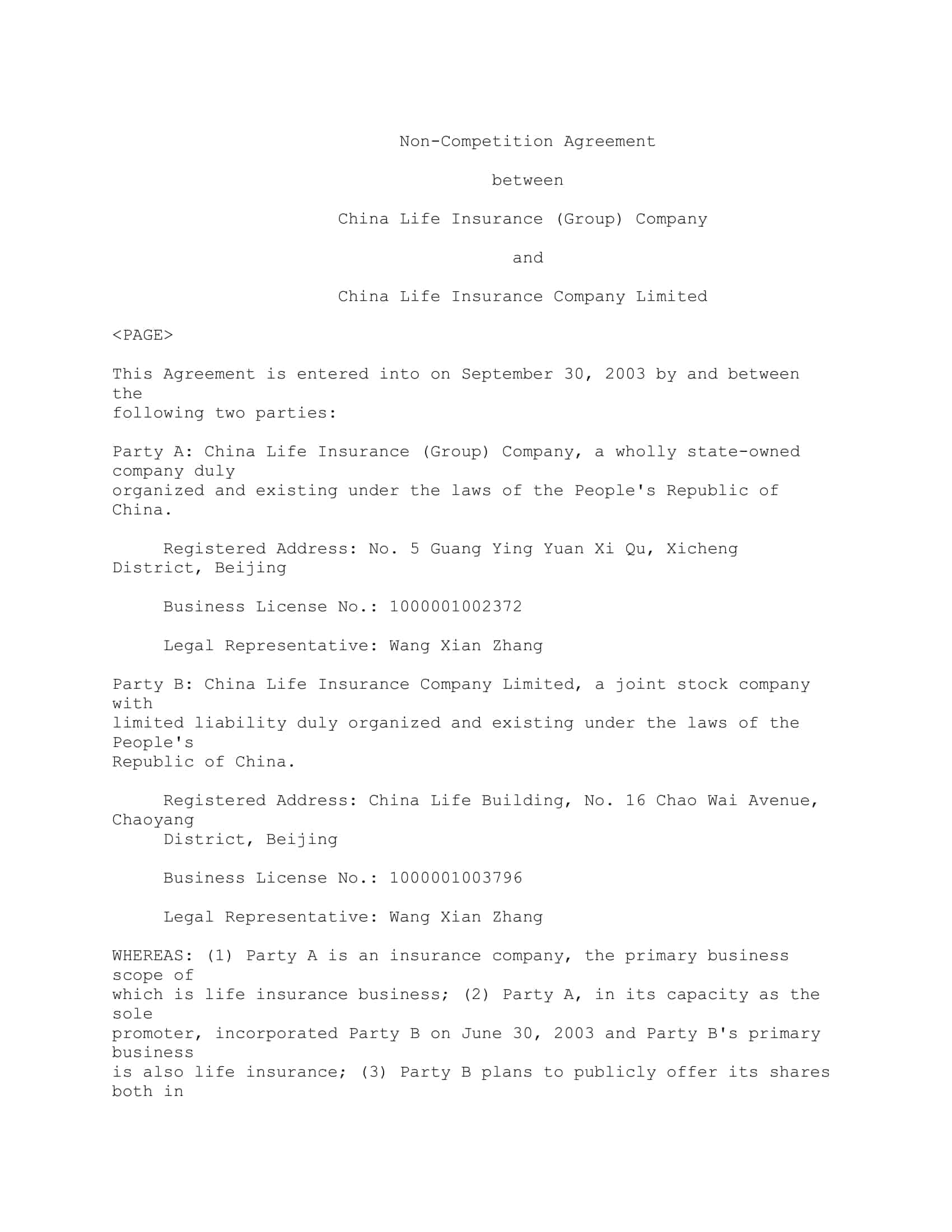

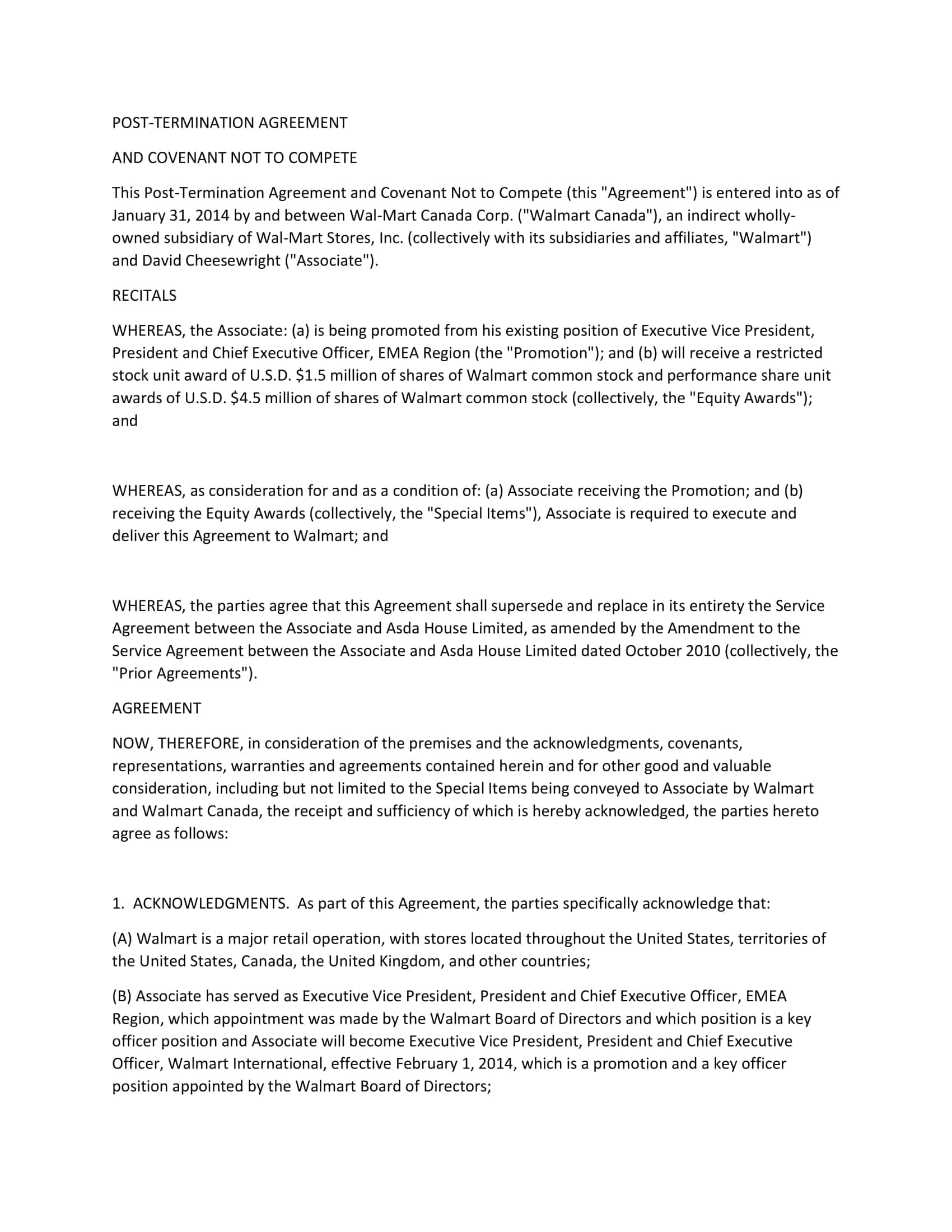
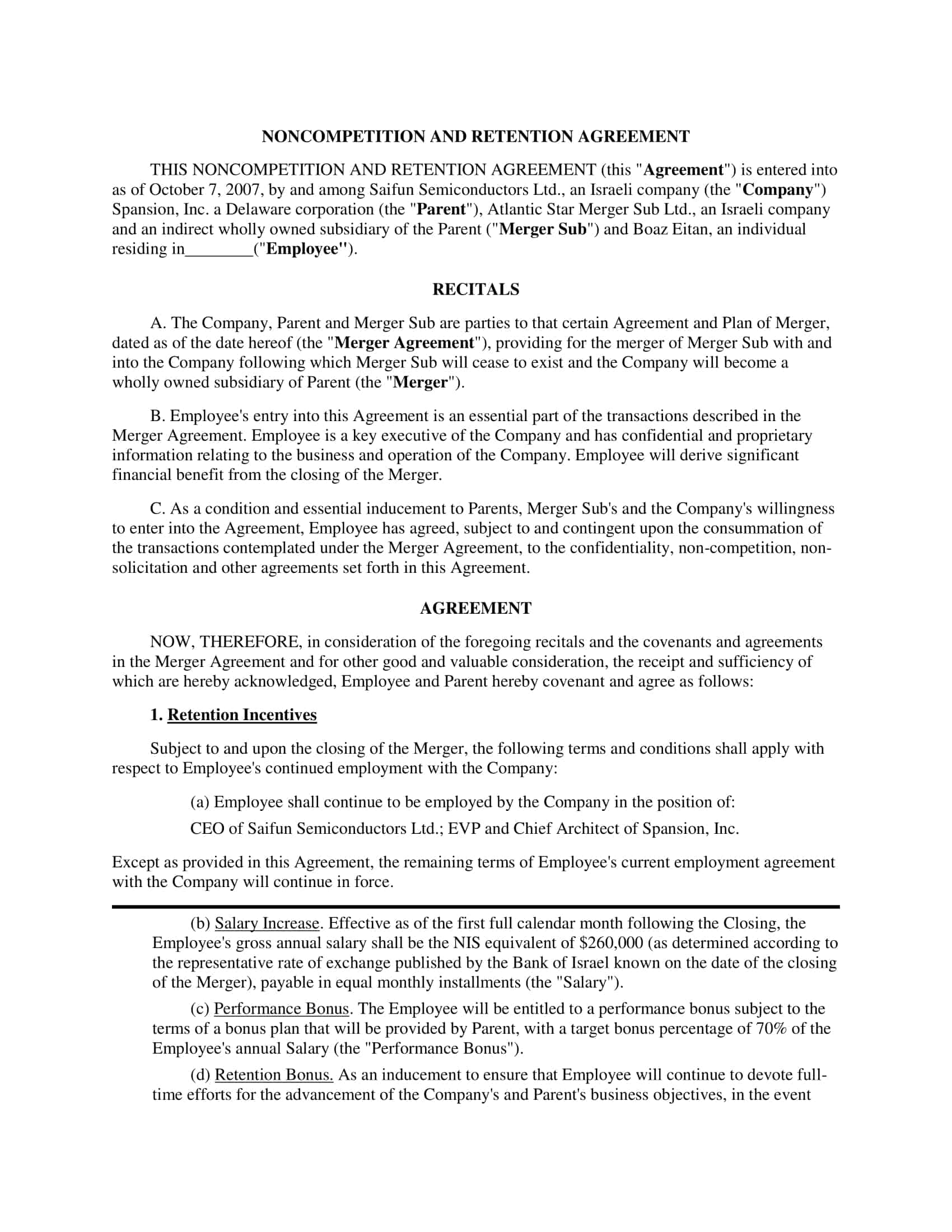

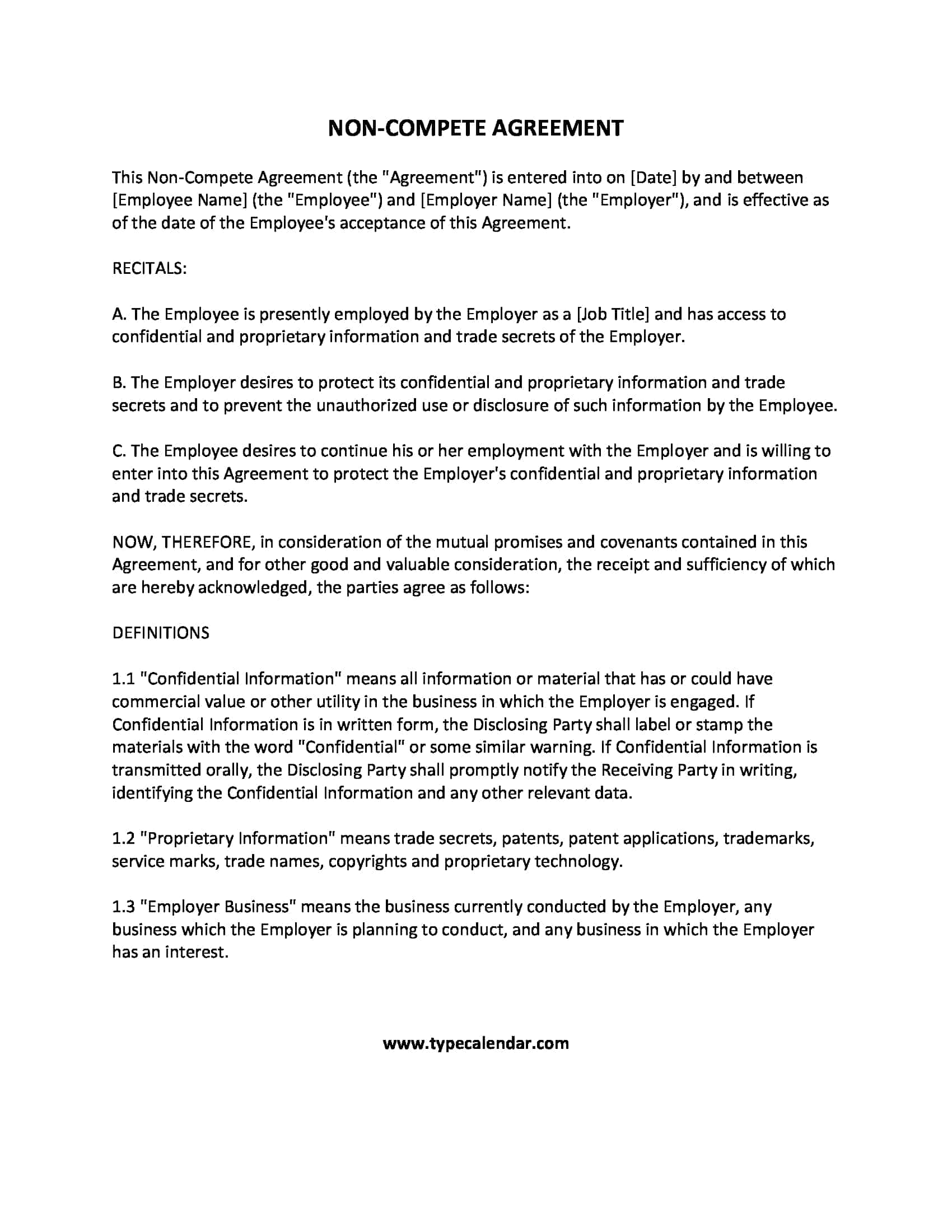








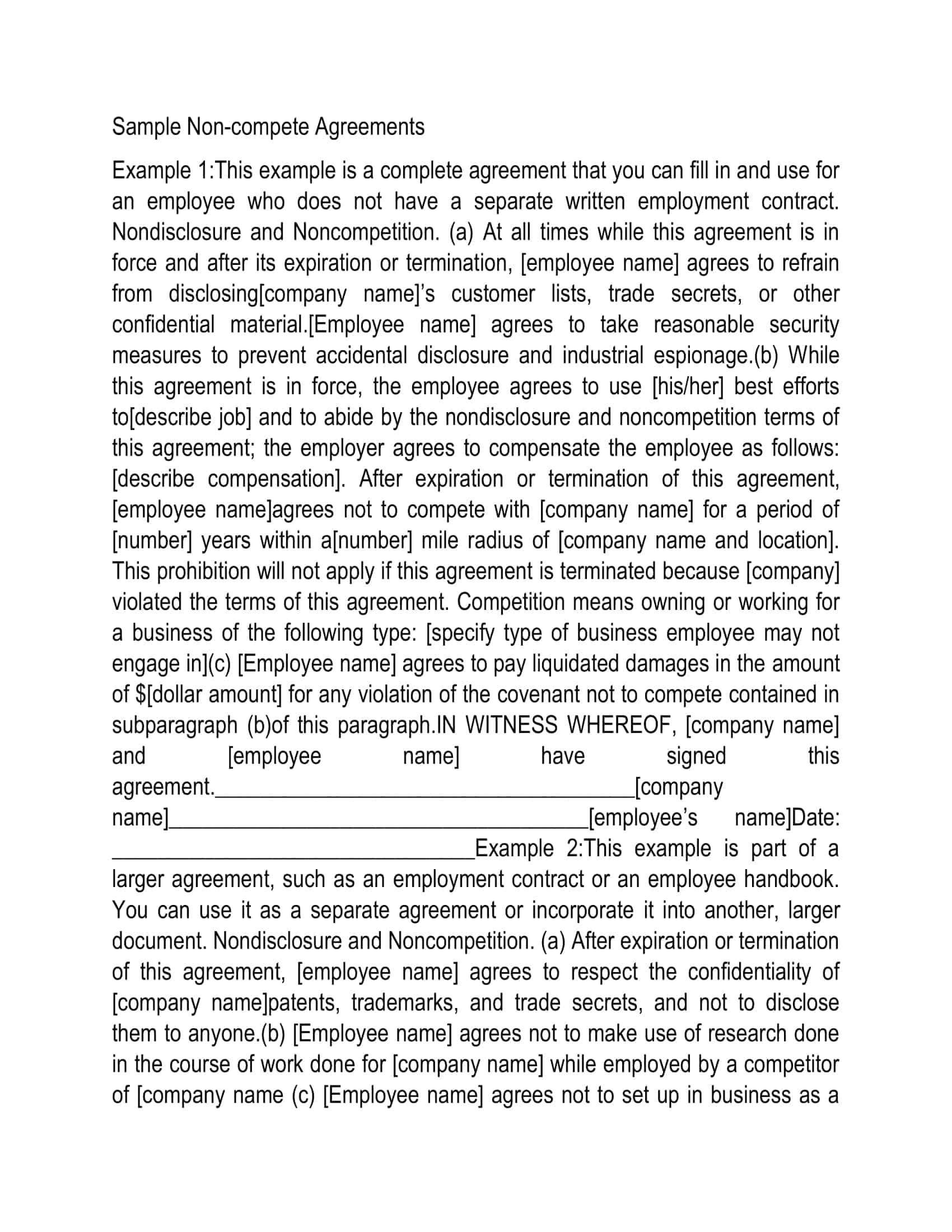
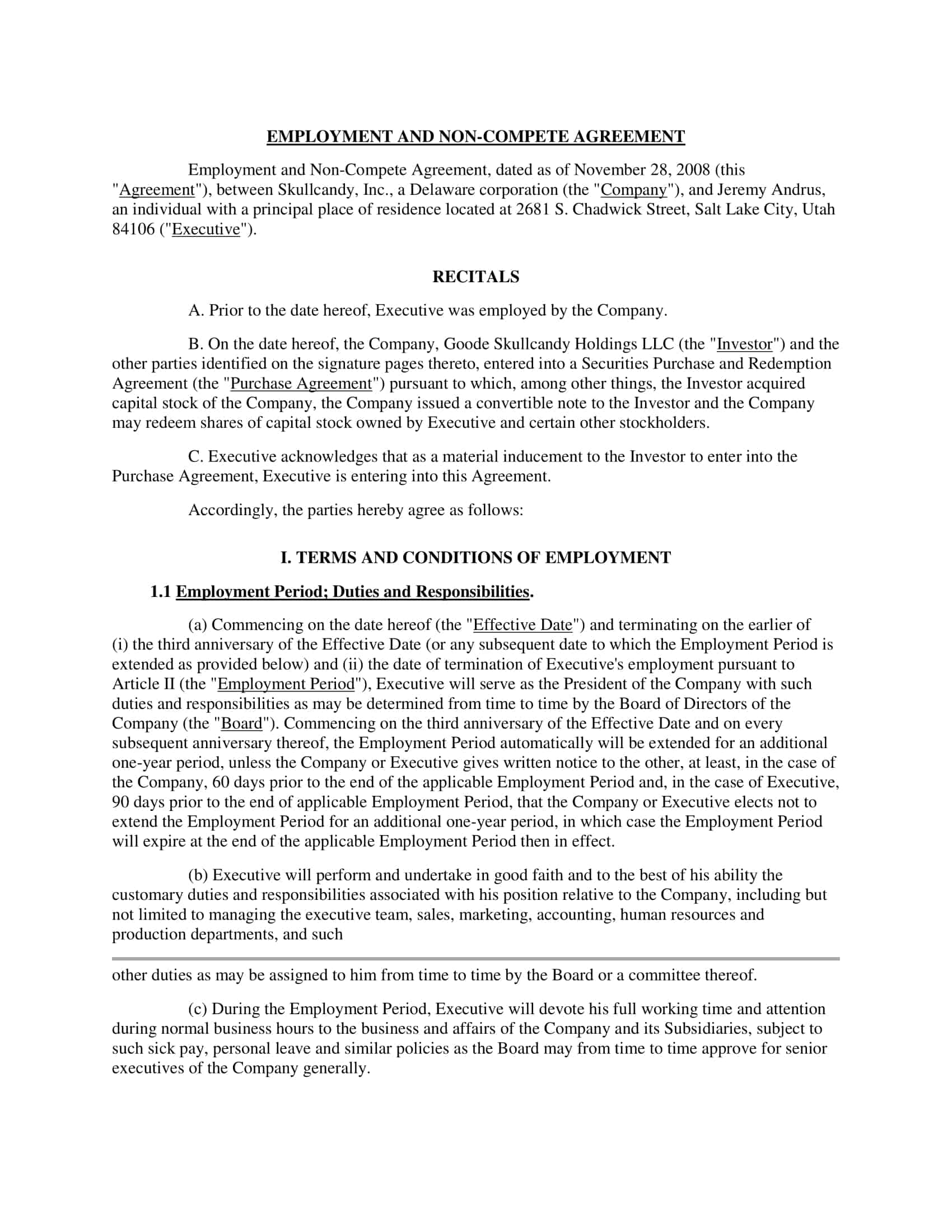


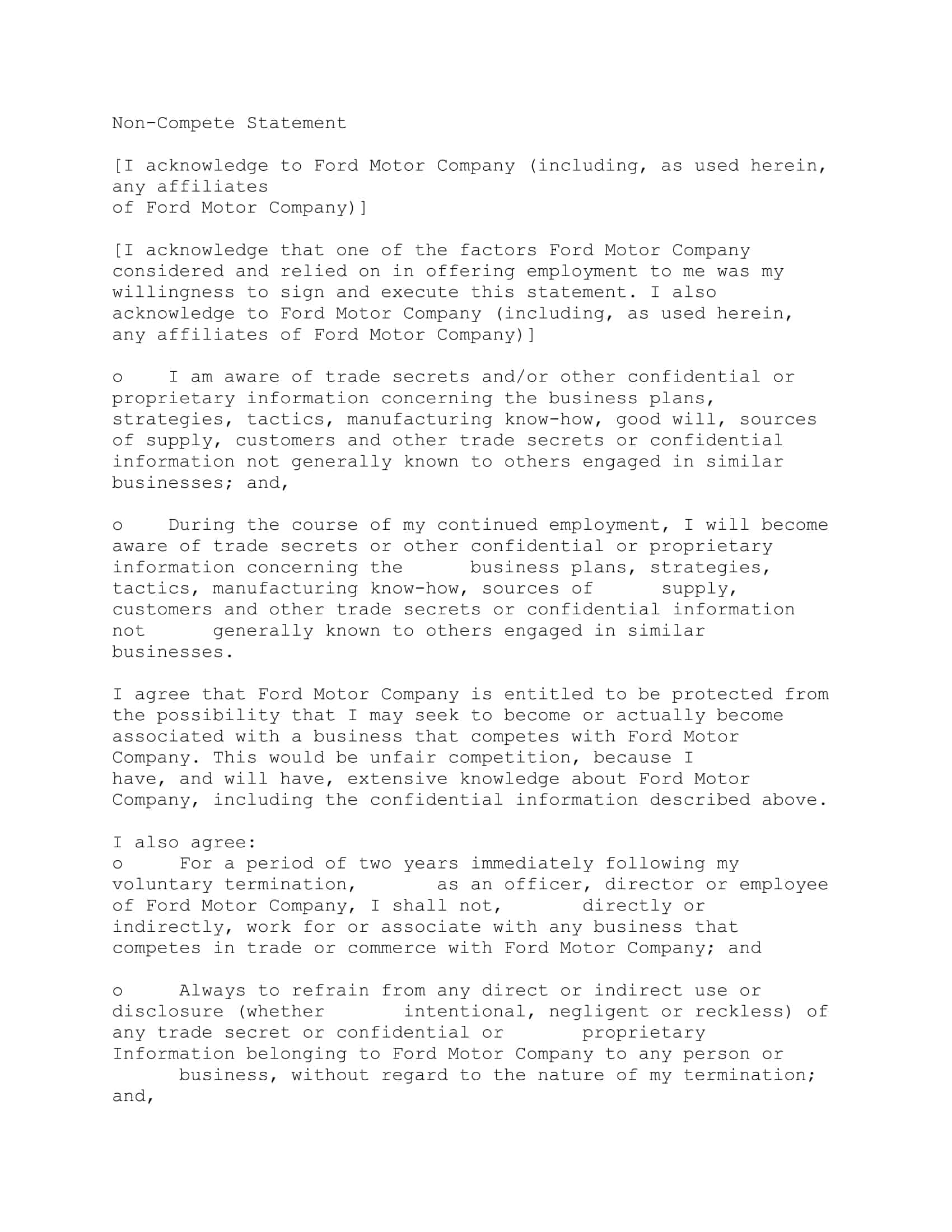


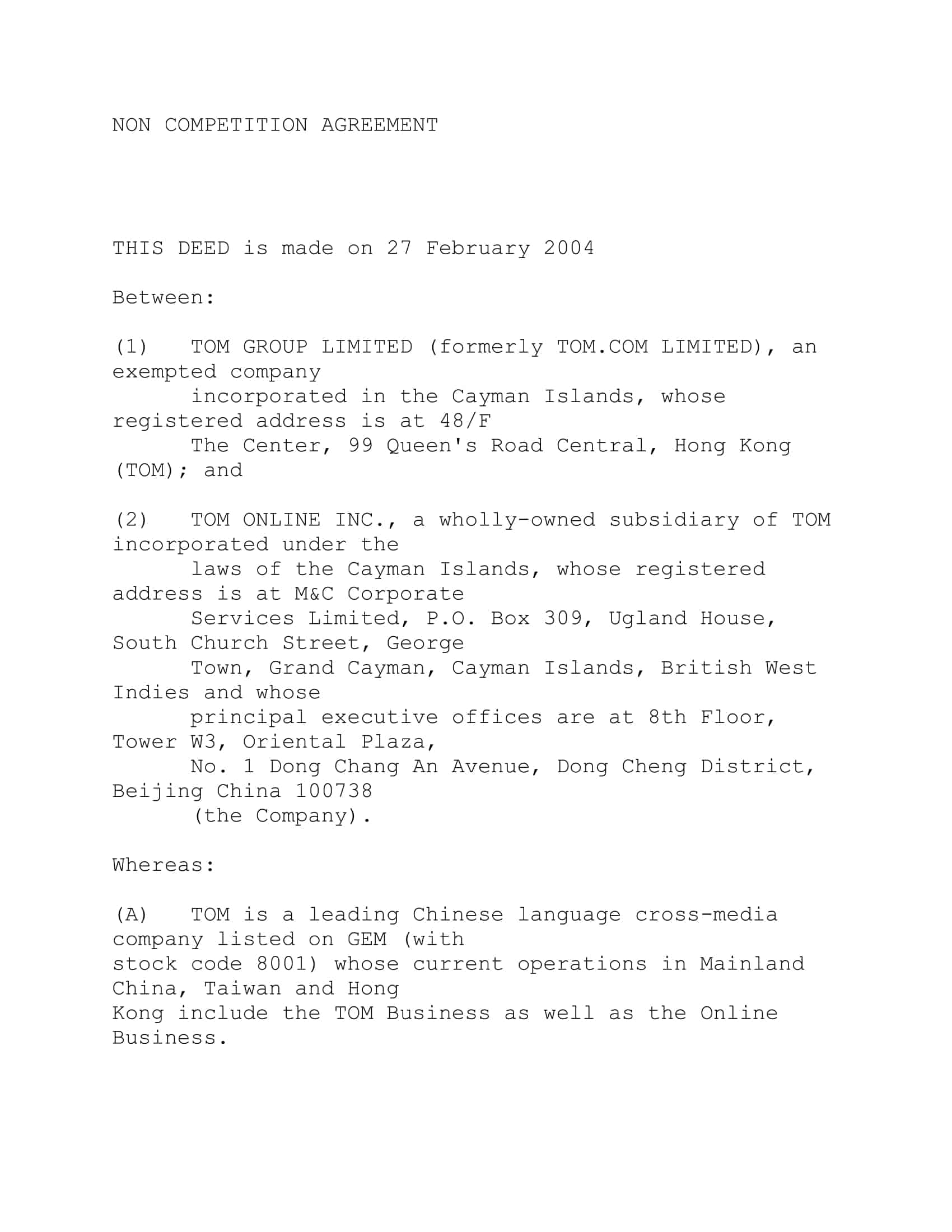


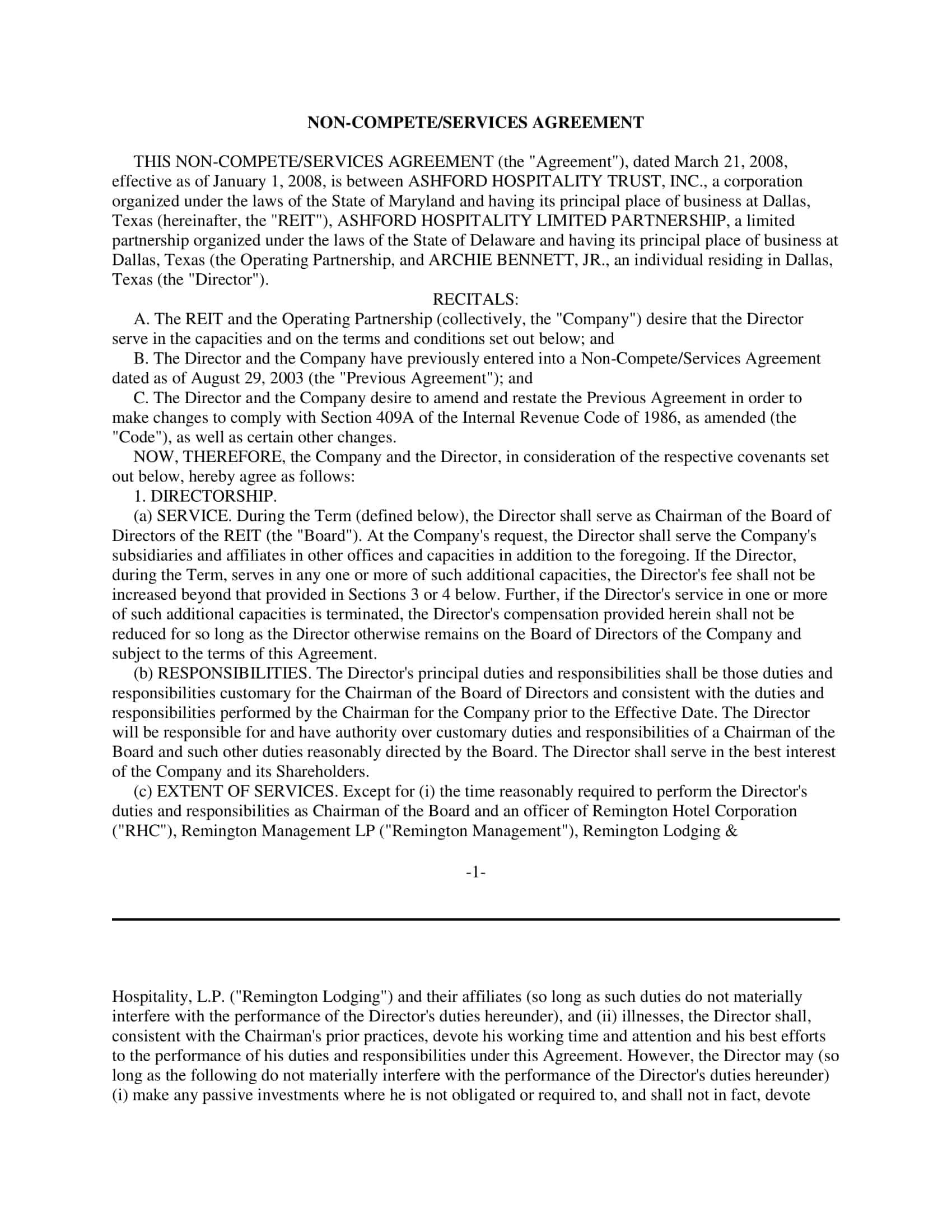

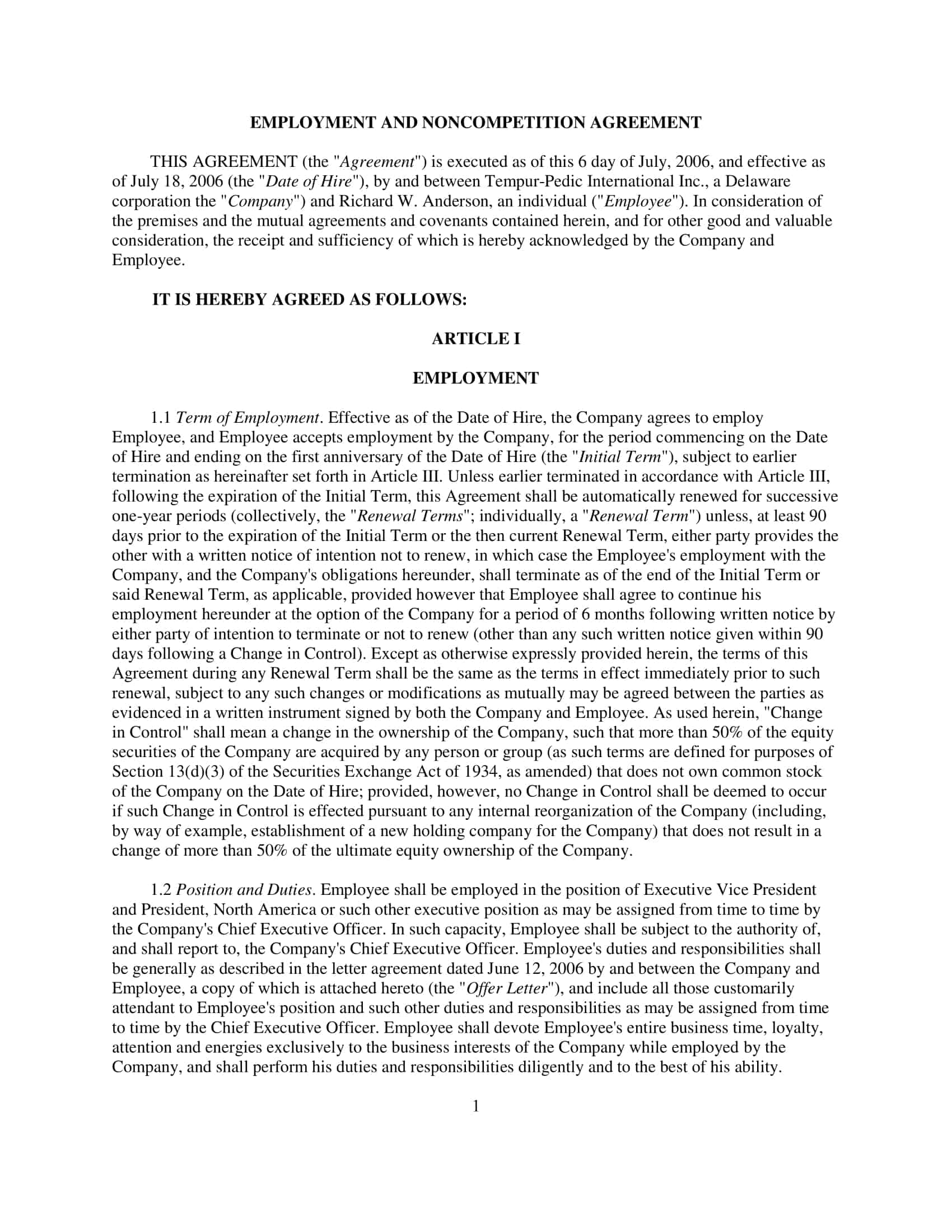
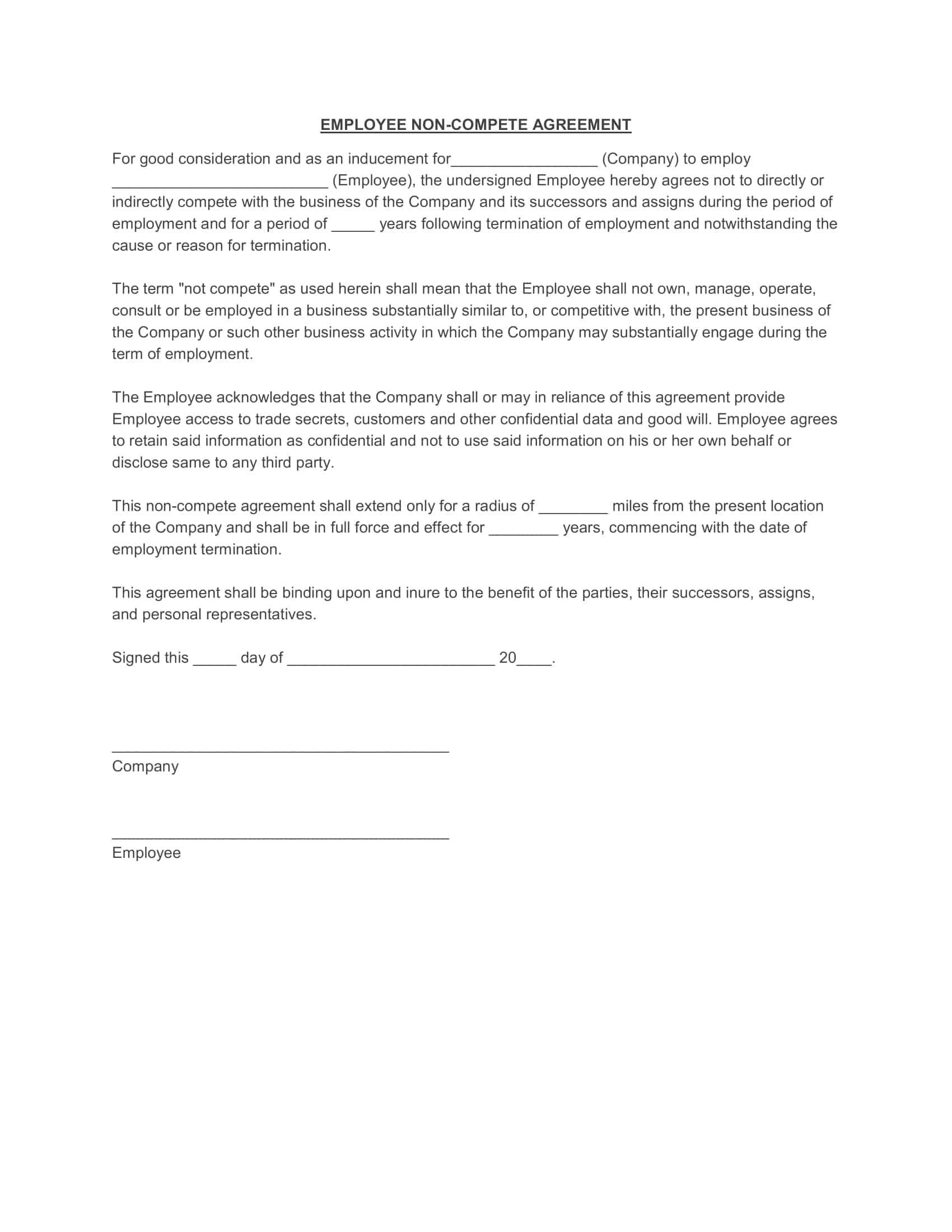





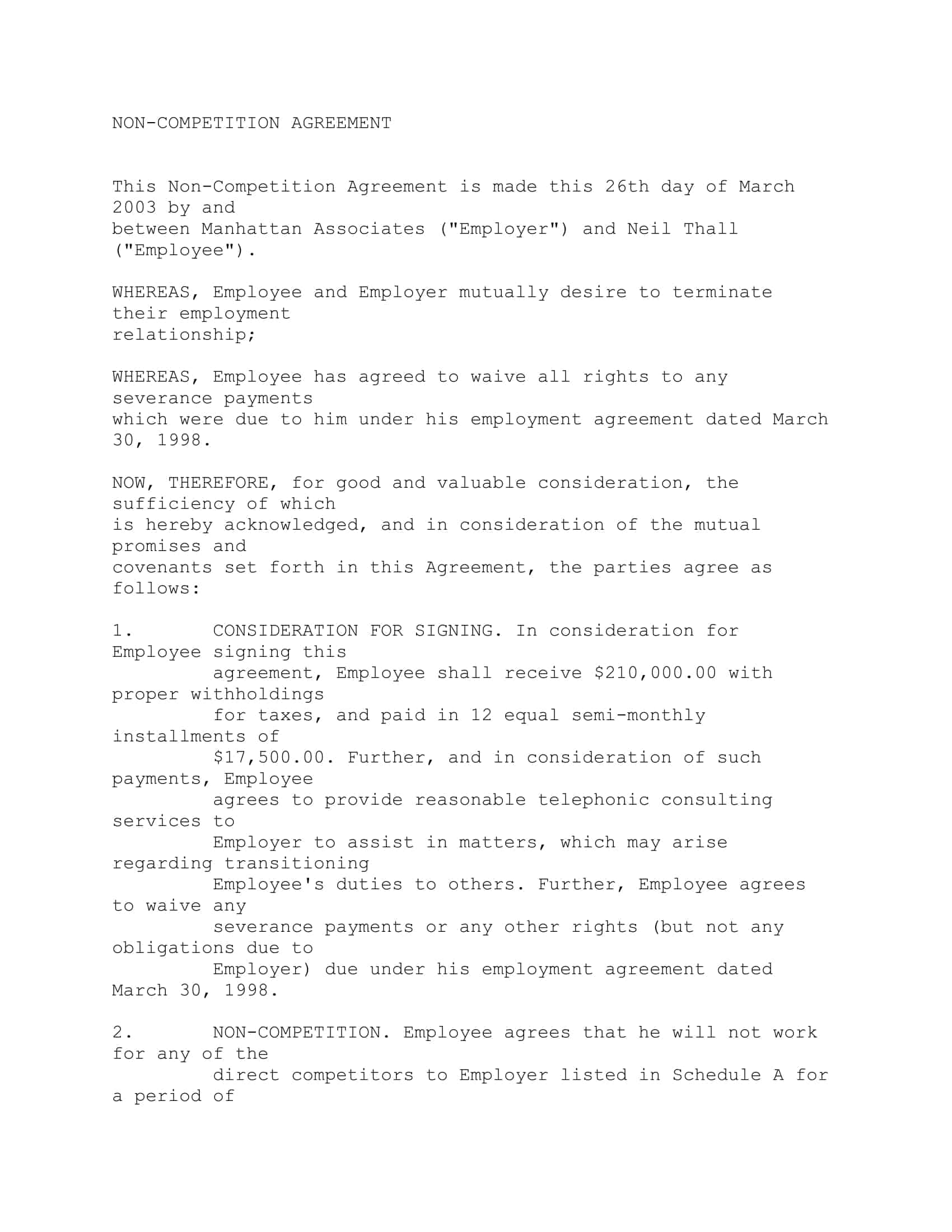






![Free Printable Roommate Agreement Templates [Word, PDF] 1 Roommate Agreement](https://www.typecalendar.com/wp-content/uploads/2023/06/Roommate-Agreement-150x150.jpg)
![%100 Free Hoodie Templates [Printable] +PDF 2 Hoodie Template](https://www.typecalendar.com/wp-content/uploads/2023/05/Hoodie-Template-1-150x150.jpg)
![Free Printable Payment Agreement Templates [PDF, Word] 3 Payment Agreement](https://www.typecalendar.com/wp-content/uploads/2023/05/Payment-Agreement-1-150x150.jpg)
